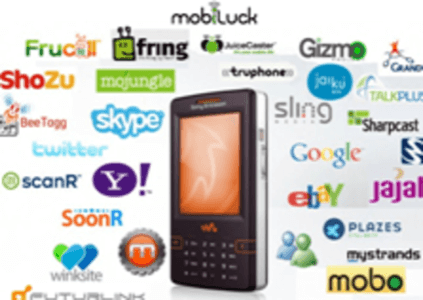Yesterday, Google announced a new mobile location-aware application called Latitude, which lets you track your friends’ whereabouts using your mobile phone. The move will have major ramifications to the current mobile social networking market which was just beginning to get off the ground. The question we must ask now is this: did Google just validate mobile social networking …or did they just kill all the competition?

Will Latitude Become the De Facto Mobile Social Network?
With the rise of smartphone-based computing, applications like Brightkite, Loopt, and others were slowly growing their user base, letting friends share posts, photos, and other information with each other as they moved from place to place out in the real world. Accessed via mobile applications or SMS, these sorts of networks provided the framework for connecting people to the places they visit.
However, it was too soon to determine whether mobile social networking was a space that would ever really take off. As studies showed, the social networks that most people accessed on the go were not specialized “mobile” networks, but the usual ones – Facebook and MySpace. Having to recreate a friend graph on new mobile social networks was not something everyone was up for…at least it hadn’t been not so far.

Without any easy way to import MySpace and Facebook friends to these newer mobile networks (like via Facebook Connect for example), our mobile social networks were filled only with an odd mix of friends: some early adopters and maybe a handful of tech-obsessed locals. But that being said, the networks still had potential assuming they could have ever gotten over the initial hump to gather critical mass. They were offering something unique, and that boded well for them. Being able to tune into the world around you and see who was there, who had been there, and what was going on was a type of augmented reality that was never possible before the advent of modern mobile computing.
Google’s Potential to Dominate
Now that Google has come onto the scene, friend graphs already intact, one has to wonder about the impact this will have on these smaller networks. How will they survive? Google is already a mainstream service and Latitude was just covered by the Wall Street Journal. Needless to say, any mainstream users out there intrigued by mobile social networking will now just go try Google’s service.
Yet where the smaller networks had the cozy feel of you and handful of friends, any service maintained by a behemoth such as Google immediately has a “Big Brother” feel to it. No matter how many opt-out features and privacy controls they offer, some people just won’t be able to shake that feeling that Google is just a little too omnipresent in our lives. But will “fear of Google” alone be enough to keep people from leaving the small mobile networks in favor of the larger one?
According to Martin May, Brightkite founder, though, Google didn’t even come close to killing his service. “With Brightkite,” he says, “we are primarily focused making meaningful connections with people you didn’t necessarily know yet, around places. Latitude seems focused on showing you where your existing friends are at. Functionality-wise, Latitude does very little beyond sharing a latitude, longitude and accuracy with friends at the moment.” But even May admits that may change down the road.
Wait…Our Real Friends Aren’t on Google
What’s strange about the mobile social networking market, though, are the missing players. The major missing players. Where is Facebook? Where is MySpace? Why is it that the biggest social networks on the planet have decidedly shunned any attempt to add proximity and mapping to their mobile services?

If anything our real friends are here, not on Google, whose friend network includes random people from our Gmail accounts, interesting folks from our RSS readers, and the occasional visitors to our blogs (thanks to the Google Friend Connect widget). Those may be people who we work with, people who wanted to share feeds with us, or fellow bloggers, but they aren’t necessarily our real-life friends. And since they’re not, why on earth would we want to share our locations with them?
The ability to connect to all our real-life, real-world friends and family – friends that include mainstream web users, mom, dad, and the kids – is something that just isn’t here yet. No matter which mobile social network you end up using, including Google’s, you’re only going to see a slice of your actual social network. A true mobile social network would integrate friends from all the major social networks we participate in, plus our bevy of work colleagues from the social network hidden in our email, and, for all those non-participants out there, it would let us add them via their mobile phone number. But that really would be creepy, so we sort of hope it never happens.
















